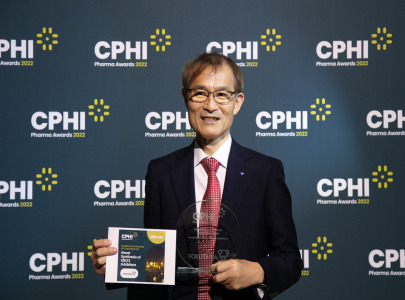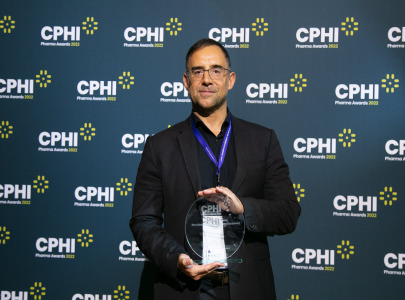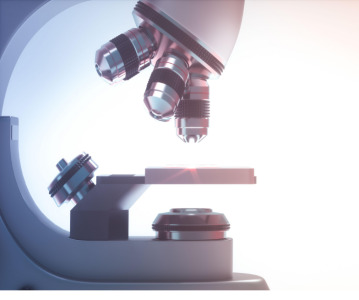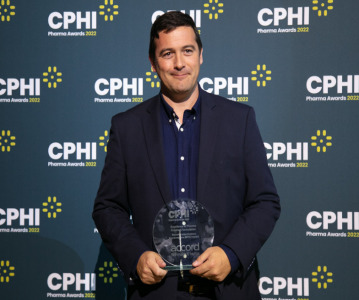CPHI Pharma Award Winners 2022: Pharmaceutical Packaging & Drug Delivery – Evonik

Evonik representatives collecting the award (left to right): Ulrich Kloeckner, Christian Hartz, Stefan Randl, Lars Geigner, and Lindsey Clark
In this series of interviews, we speak to the teams behind the winning concepts at CPHI Pharma Awards 2022, which was held at CPHI Frankfurt, across the categories from digital innovation to CEO of the year.
The category of Pharmaceutical Packaging & Drug Delivery yielded the winners, as chosen by our jury, Evonik, for their delivery solution LNPs: Polymeric nucleic acid delivery.
 In this interview we spoke to Paul Spencer, Head of Drug Delivery & Products, Evonik Health Care, about their teams' award winning work.
In this interview we spoke to Paul Spencer, Head of Drug Delivery & Products, Evonik Health Care, about their teams' award winning work.
Firstly, can you tell us a little more about Evonik and your key priorities for the year ahead?
Evonik’s Health Care business line is a global innovation hub for the world’s leading life science companies. Therapies using a range of nucleic acids have great potential to treat cancer, metabolic or infectious diseases – enabling a new era in medicine. Specialised contract development and manufacturing partners with a high degree of flexibility will play a crucial role in supporting the pharmaceutical industry to realise the potential of gene therapies and their future applications. Our priority is to support customers at any stage of the drug development process. This includes manufacturing pharmaceutical excipients and the production of clinical drug products through commercial quantities as a fully integrated solutions provider for advanced drug delivery. Focusing on the development of innovative and differentiating solutions in the area of mRNA delivery will greatly advance the realisation of new treatment options.
This year, you won the CPHI Pharma Awards for LNPs: Polymeric nucleic acid delivery, can you tell us more about the winning concept?
The charge altering release transporter (CARTs) technology can offer several advantages over classical LNPs, most notably that polymer-based formulations enable the design of delivery vehicles that can target different organs beyond the liver, such as the spleen. Compared to mRNA-LNPs, which present a very complex composition of several excipients, the polymer in the CARTs technology is the only excipient that must be mixed with the mRNA. Overall, CARTs have the potential to be a simpler system than LNPs from the perspective of manufacturing.
Can you outline why your approach could lead to overall improvement in patient health?
The approval and success of the mRNA-based COVID-19 vaccines, together with currently approved ASO, siRNA and DNA drugs and vaccines, is setting the foundation for a new generation of APIs that will be transformational for patients. Nucleic acid therapeutics have an enormous potential to improve existing therapies and in developing new therapies and treatments for previously undruggable diseases. Applications go far beyond vaccination and include, for example, protein replacement and CRISPR/Cas9-mediated gene therapy.
Although the potential of nucleic acid therapeutics is huge, delivering these APIs to the site of action remains a challenge due to their limited stability and physiochemical properties. Like other cationic/ionizable lipids and polymers, CARTs belong to a class of specialty excipients, which are essentially needed to protect and deliver nucleic acid therapeutics to their site of action. By developing such excipients, we can unlock the therapeutic potential of many nucleic acid therapeutics and improve patient health.
What do you think is needed from the pharma industry as a whole to support end-to-end services become a more conscious and sustainable industry?
Without a doubt, drug development and the pharma industry have a significant positive impact on human health and society. However, as the negative human impact on our environment continues to increase, the pharma industry – alongside all other industries – will need to act to reduce its environmental footprint, improve sustainability and enable us to live within the boundaries of our planet. At Evonik’s life sciences division, Nutrition & Care, we have made sustainability our guiding business principle. This means we consider our footprint along the whole value chain and the handprint of our products and services throughout the entire lifecycle. There are numerous opportunities to improve the sustainability from start to finish along a drug’s lifecycle starting from product portfolio and initial chemistry to sourcing, scale-up, process improvement, right through to recycling, recovery, energy tracking, and waste handling. Innovations in pharmaceutical design and functionality, alongside strong sustainability metrics are needed to support a transformation to a sustainable industry. Evonik Health Care has set the goal of becoming carbon neutral in scope 1 and 2 emissions by 2030.
How will this product/technology/work benefit the pharma industry over the coming years?
Current lipid and polymer-based delivery strategies target the liver. CARTs, therefore, fill an unmet need for the delivery of nucleic acids to organs and tissues beyond the liver. We hope that CARTs could become a standard excipient for nucleic acid delivery to different target organs, tissues and cells, and meet the delivery challenges for nucleic acid therapeutics faced by the pharma industry.
What does winning the award mean to you and what will it do for you as a company?
Winning the award is a big motivation for developing the CARTs into a commercial product. We are excited about playing a part in the new generation of nucleic acid therapeutics and ultimately improving patients’ lives.
You’ve set the bar high with this concept, can we expect to keep seeing more innovative work from you in the future?
Yes, winning this award provides us with the motivation to develop future innovations for RNA-based therapeutics going forward.
Related News
-
News CPHI Pharma Award Winners 2022: Digital Innovation – ATMPS Ltd
In this series of interviews, we speak to the teams behind the winning concepts at CPHI Pharma Awards 2022, in each of the different categories, from digital innovation to CEO of the year. -
News CPHI Pharma Award Winners 2022: Supply Chain, Logistics, and Distribution – HCLTech
In this series of interviews, we speak to the teams behind the winning concepts at CPHI Pharma Awards 2022, in each of the different categories, from digital innovation to CEO of the year. -
News CPHI Pharma Award Winners 2022: CEO of the Year – Aragen Life Sciences
In this series of interviews, we speak to the teams behind the winning concepts at CPHI Pharma Awards 2022, in each of the different categories, from digital innovation to CEO of the year. -
News CPHI Pharma Award Winners 2022: API Development – Tokuyama Corporation
In this series of interviews, we speak to the teams behind the winning concepts at CPHI Pharma Awards 2022, which was held at CPHI Frankfurt, across the categories from digital innovation to CEO of the year. -
News CPHI Pharma Award Winners 2022: Manufacturing, Tech, and Equipment – Just-Evotec Biologics
In this series of interviews, we speak to the teams behind the winning concepts at CPHI Pharma Awards 2022, in each of the different categories, from digital innovation to CEO of the year. -
News CPHI Frankfurt 2022: Innovator Interview - Lonza Small Molecules
In this series of interviews, we speak to companies on the CPHI Frankfurt show floor who are driving innovation in pharma for a better healthcare future. Here, we spoke to Henny Zijlstra, Senior Director, Commercial Development at Lonza Small Molecules... -
News CPHI Frankfurt 2022: Innovator Interview - Sharp
In this series of interviews, we speak to companies on the CPHI Frankfurt show floor who are driving innovation in pharma for a better healthcare future. We spoke with Alexander Schäfer, BD Manager Europe of Sharp to understand the current la... -
News CPHI Pharma Award Winners 2022: Finished Formulation – Accord Healthcare
In this series of interviews, we speak to the teams behind the winning concepts at CPHI Pharma Awards 2022, in each of the different categories, from digital innovation to CEO of the year.
Position your company at the heart of the global Pharma industry with a CPHI Online membership
-
Your products and solutions visible to thousands of visitors within the largest Pharma marketplace
-
Generate high-quality, engaged leads for your business, all year round
-
Promote your business as the industry’s thought-leader by hosting your reports, brochures and videos within your profile
-
Your company’s profile boosted at all participating CPHI events
-
An easy-to-use platform with a detailed dashboard showing your leads and performance

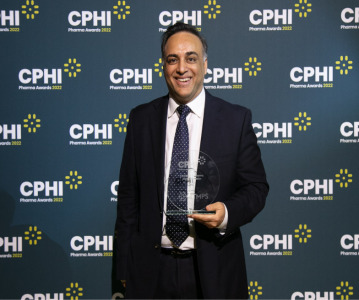
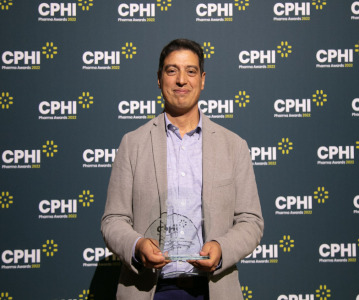
.png)
